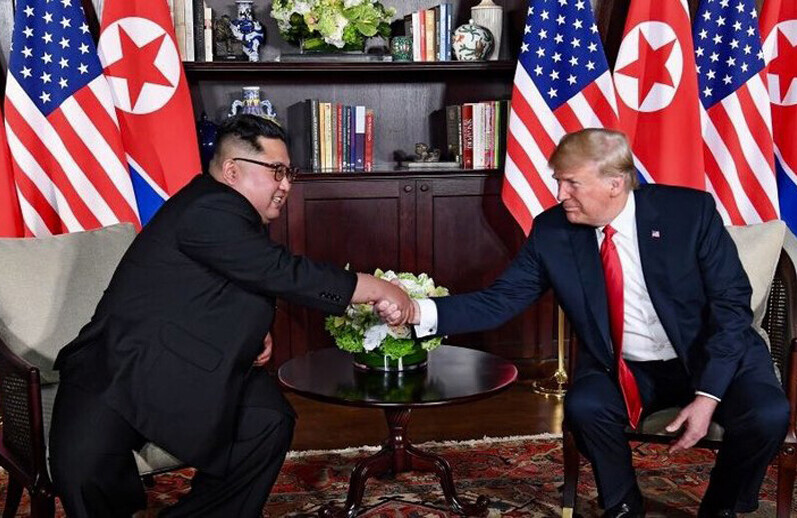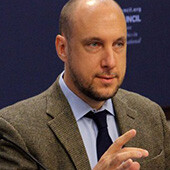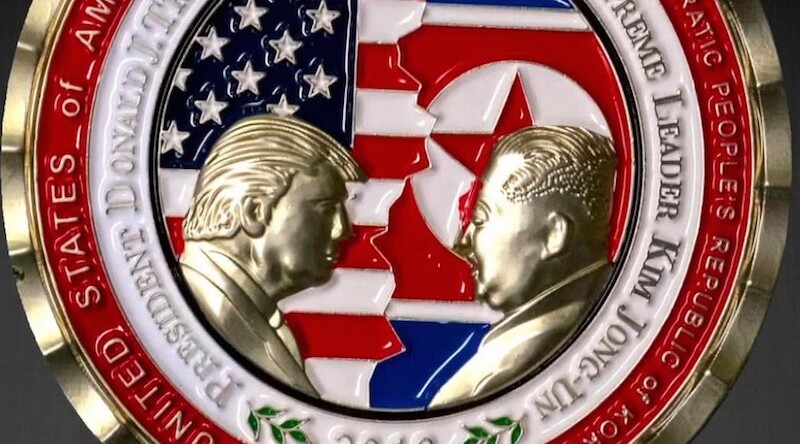The widespread scorn on social media and in the mainstream press toward the Trump-Kim summit in Singapore since its conclusion earlier this week has been startling. As a long-time Asia watcher, I feel it's important to defend the value of the Singapore summit. The meeting has served to establish rapport between the U.S. and North Korean leaders and a more positive tone, reduce the chance of war, launch a framework for technical arms negotiations, and set the broad goal of peace on the Korean Peninsula. All unthinkable a few months ago. To be sure, the cynics were already in the majority even before the summit. Partisans had made up their minds. I conducted an unscientific poll on my Twitter feed the day before the summit that got more than 111 votes, out of which 74 percent expected "nothing" from the Singapore meeting. That captured the sentiment on social media. Moreover, given Trump's low approval ratings, bashing anything that the president does has become the default position for the elite commentariat. A disturbing thing I have noticed is that the criticisms of the summit lack logical coherence with expert analysis on North Korea. In other words, critics are simultaneously criticizing the summit and echoing consensus opinion even when the two points of view contradict one another—in what amounts to cognitive dissonance. In lieu of rational arguments, America's "Outrage Industry" has expanded into the foreign policy realm. What are some of these consensus background assumptions? First, the North Korean regime has spent decades developing a nuclear arsenal and has recently spent a great deal of resources in making sure its missiles can hit the United States. Pyongyang views the possession of this arsenal as a guarantee of its survival, a safeguard that it will not give up unless it has an extraordinary security guarantee, such as a peace treaty, or if the Northeast Asian security environment changes drastically. Giving up its nuclear weapons en masse, known as the "Libya model," is a nonstarter for North Korea as Libyan leader Gaddafi ended up deposed and murdered. For that reason, many observers were relieved that Secretary of State Pompeo moved to the foreground at the expense of Trump's national security advisor John Bolton, who was advocating the Libya model. Second, diplomacy is preferable to hostility and war. This is no trivial matter. As Victor Cha and other Korea experts have noted, the summit has steered the world away from the prospect of catastrophic war, which was a real possibility just five months ago. The current talks have "for the first time since 1953, opened the door to peace on the Korean Peninsula," Cha has argued. In addition, a plan or framework for peace is better than no plan at all. The establishment of rapport and even trust between Trump and Kim is preferable to distrust and silence. In sum, a paranoid hermit state issuing constant threats is far more dangerous than a recognized nuclear state that has its channels of communication open. Third, perceptions, attitudes, trust, rapport, and other intangible factors matter in international relations. The low bar set for the Trump-Kim summit allowed both sides to feel like the meeting was a success without the risk of the meeting backfiring into conflict. Both leaders are famously image-conscious and obsessed with loyalty. The absurd pageantry of the summit, which was compared to a royal wedding, gave both leaders what they needed to satisfy their domestic constituencies: in Trump's case, his base; in Kim's, the state-run media. It was, however, a much better, equitable show than was then-Secretary of State Madeleine Albright's visit to Pyongyang in October 2000. In short, the attitudes of these two volatile leaders are important, and they departed the summit satisfied. As the relationship between Reagan and Gorbachev showed, personal rapport and trust make a difference. Given all the points above, the Trump-Kim meeting was a positive step and its outcome was probably the best one could hope for. The summit was modest but in the realm of the possible. And yet most opinion-makers scoffed at the summit, dismissing it as pure farce. The summit may have been political theater (aren't most politics?), but it was not meaningless. Below are some of the arguments that have been deployed against the summit. I will attempt to address each criticism one-by-one in the style of the retired "Think Again" section of Foreign Policy magazine. "Trump got played." Nonsense. Trump left the summit with exactly what he wanted: A general statement of intentions about peace on the Korean Peninsula, glitzy footage from the summit itself, a superficial, political "success" for his base, and the establishment of personal rapport with Kim. Trump offered to pause military drills with South Korea while negotiations were taking place but could easily restart those drills if he felt things were not progressing. Meanwhile, the security situation in Northeast Asia dramatically favors the U.S. and its allies Japan and South Korea with U.S. troops based in both countries. Some argue that the United States should have simply kept up maximum pressure and isolation of Kim's regime, but during North Korea's isolation, it has built a successful nuclear arsenal faster than anyone expected. "Trump gave away all our leverage." No. On one hand, the pause in U.S.-ROK military drills is temporary. It is in line with the reasonable "freeze-for-freeze" formulation, meaning a stop in U.S.-ROK military drills in exchange for a stop in North Korean missile and nuclear testing. On the other hand, the United States holds massive leverage and bargaining chips in its economic sanctions, troop deployments in Japan and Korea, overwhelming military superiority, and promise of aid, trade, and investment. The prospect of economic growth at this moment will appeal to Kim, given his April 20 speech about pursuing "higher goals" of dignified prosperity now that he has attained the nuclear "sword." As Evan Osnos has written, Kim may be learning the lessons of China's Communist Party that a nation must "change or die." "There was no mention of CVID." True, but that may be a good thing. Complete (or comprehensive), Verifiable, Irreversible Denuclearization (or Disarmament) or "CVID" is a chimera. The recent example of actual "complete" disarmament was the case of Libya physically dismantling its nuclear program and shipping it off. As we know, if anything, Gaddafi's deadly fate afterward set an example of how not to negotiate arms control. Moreover, nuclear programs are extremely complicated, and are hardly irreversible or completely verifiable. Nuclear deterrence and open diplomacy are more reliable than inspections. Finally, the "D" in CVID has come to mean "denuclearization" rather than "disarmament." As Joshua Keating has written, the phrase "denuclearization of the Korean Peninsula" is contested and vague. To the North Koreans, according to Victor Cha, the phrase means the desire for the peninsula to be free of nuclear weapons at some time in the future—"when there is no longer any threat to North Korea." Instead of chasing a chimera, it's wiser to focus on more effective instruments of statecraft. "We are giving away influence to China." Doubtful. It's been noted that the freeze-for-freeze agreement was China's preferred outcome of this summit, but that does not necessarily mean it's bad for the United States. Remember, the United States has thousands of troops near China, something that would be unacceptable the other way around. Who can blame China for wanting more influence in its own region? One longer-term concern is that a peaceful, more open North Korea would expedite the unification process of the two Koreas, and the resulting unified Korea would be naturally pro-China. First such a scenario would likely take a very long time after achieving the more immediate goal of integrating North Korea into the community of nations. Second, it is not certain a unified Korea would be governed like authoritarian China, democratic South Korea, or something in between. Finally, it's far from clear whether a unified Korea would tilt toward China or the United States, or simply forge a more independent stance. "The summit was an embarrassing spectacle." Compared to what? The famous October 2000 visit by then-Secretary of State Albright to Pyongyang was a truly embarrassing spectacle. In photographs at a Pyongyang stadium and in front of an imposing tableau of crashing waves, Albright was made to be seen as a puppet or propaganda tool, subordinate, and in awe of the Communist North. Interestingly, former President Bill Clinton in 2009 was photographed with Kim Jong-il in front of the same painting in Pyongyang. The Trump-Kim summit was ornate and tacky, sure, but at least the two leaders were presented as having equal footing. In terms of optics, the Trump-Kim meeting was safer than the Albright visit, and if the argument is that the United States "legitimized" the repressive regime, it's too late and we are already talking to many other unsavory and less dangerous ones. Keeping the North in the dark does not make it less threatening. "There was no discussion of North Korean human rights." That's backwards. Albright wagged her finger during her 2000 visit and admonished the North to improve its human rights record. So the Clinton administration approach with North Korea was lecture first, then hope for disarmament and improved relations. Trump is doing everything in reverse, including holding the summit before the technical negotiations. The same might apply to human rights. The fate of thousands of people in North Korea's gulags and those suffering from poverty might be better helped by coaxing the country to open up and foster economic growth. Finally, Trump has a point that the United States has lost a lot of moral high ground and ability to lecture. I am not making a moral equivalence, but a country such as the United States lecturing the world about morality rings increasingly hollow abroad. Which brings me to some final thoughts about perspective. The sanctimonious, self-indulgent reaction in the West toward the Trump-Kim summit belies an anachronistic understanding of U.S preeminence that ended after the 1990s. And it reflects an American-centric view of the world. It's a view that is insensitive to the daily experience of people actually living in East Asia. While Americans scream at one another on social media about the summit, millions of citizens in Japan, South Korea, and North Korea are finally seeing a glimmer of hope for a more peaceful region. After all, it is really the millions of Japanese and Koreans who are the most vulnerable to the threat of war. Trump's motto is "America First," but this summit may end up being a surprisingly magnanimous act.


